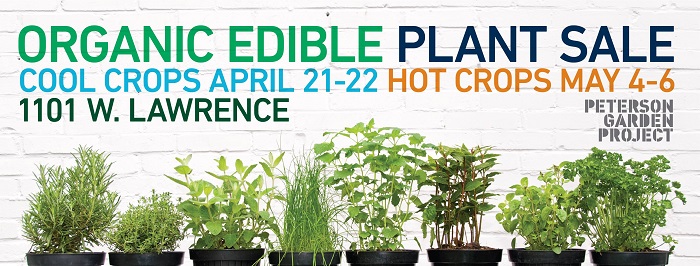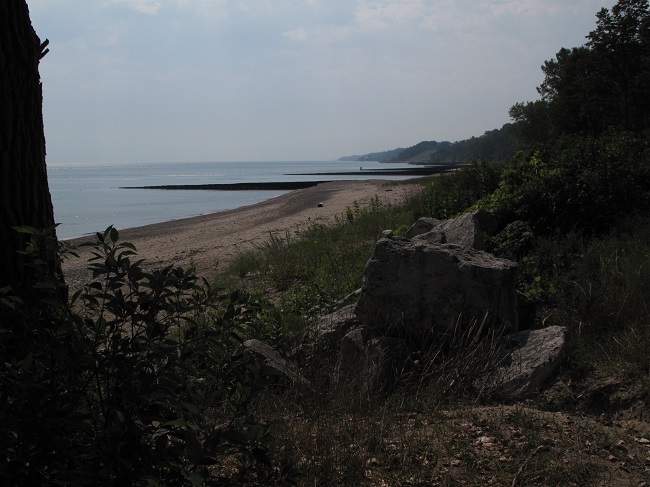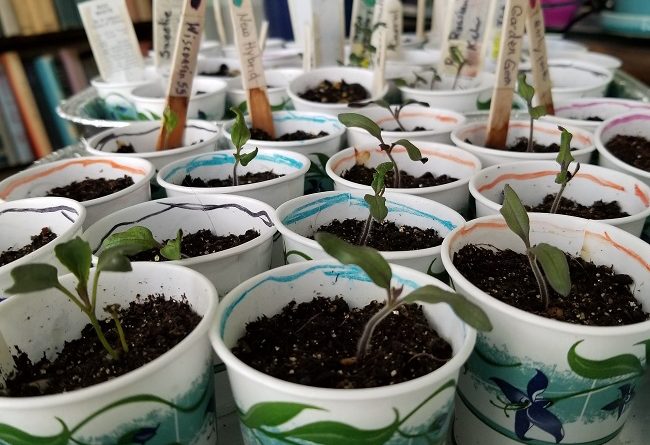April 8, 2018 – Anticipation…
If you’re a gardener in early April, you know what “anticipation” means.
![]() For folks in the upper Midwest and Northeast, it has been long, slow climb out of winter…and we’re not there yet. Our meteorologist Rick DiMaio says that by the end of this week, we might finally be flirting with 70 degree temperatures. Regardless, this is the time of year for plant sales of all shapes and sizes. We talk about two of them today–the Peterson Garden Project annual Organic Edible Plant Sale and the Openlands Native Plant Sale in Lake County.
For folks in the upper Midwest and Northeast, it has been long, slow climb out of winter…and we’re not there yet. Our meteorologist Rick DiMaio says that by the end of this week, we might finally be flirting with 70 degree temperatures. Regardless, this is the time of year for plant sales of all shapes and sizes. We talk about two of them today–the Peterson Garden Project annual Organic Edible Plant Sale and the Openlands Native Plant Sale in Lake County.
Those are just two of many sales that are occurring in the Chicago area in the next couple of months. When it comes to native plants, however, the most comprehensive list we’ve seen has been compiled by Chicago Living Corridors. You can click here on 2018 Native Plant Sales; we also have a logo on the home page of this website that connects to the well-researched list.
On to today’s show…
At The Mike Nowak Show, we’re huge fans of the Peterson Garden Project.
We usually figure out how to get them on the program a couple of times each year to talk about their latest projects. And it took me only a few years to figure out that their mission is not about plots of land that can become gardens, but rather the people who tend those plots. As they explain on their website,
People interested in gardening with Peterson Garden Project do not need any prior gardening experience. The mission of the project is to teach people how to grow their own food, so we’re looking to recruit ‘grewbies’—our term for people new to growing food – as well as experienced gardeners.
They like to use the term “Pop-up Victory Garden” for their seven north side locations (eight, if you count the Edible Treasures workplace garden at the Field Museum). Membership is $85 and includes in-garden classes and other learning support, events, some supplies, shared tools, and one 4×8 raised bed filled with organic soil. It’s important to note that the gardens don’t necessarily last forever–PGP has been known to pull up tomato stakes and move on when a land owner decides to plop a building where a pop-up garden once stood.

But they’re always on the lookout for new plots of land. This year, the new kid in the neighborhood is the GrowUptown Garden at Broadway and Sunnyside. While the other gardens will open up on April 21, the starting date for GrowUptown has yet to be determined.
And like Creeping Charlie, PGP has extended its reach into all kinds of areas. For instance, their Community Cooking School on the second floor of the Broadway Armory at 5917 N. Broadway in the Edgewater community is a place where they bring neighbors, family members, young, old, chefs, farmers, entrepreneurs and more together to learn the skill of preparing food.
PGP also features classes and events and plenty of volunteering opportunities. Their Grow2Give™ program, which shares fresh produce with local food pantries or nutrition programs, has donated six tons of food since 2010. They’ve also published two books, Fearless Food Gardening in Chicagoland and Start a Community Food Garden: The Essential Handbook, they have a series of food growing videos called The Gardening Minute, and you can follow their exploits on their We Can Grow It blog.
But the real reason that Peterson Garden Project founder and executive director LaManda Joy is with us this morning is so that Peggy and I can get the inside scoop on their annual Organic Edible Plant Sale. Actually, there are two sales–the cool crops will be sold on April 21 and 22, and the hot crops are available on May 4, 5 & 6. As PGP notes,
Our seedlings are grown locally this year by Montalbano Farms. All seedlings are certified organic and chosen to perform well in our Midwestern climate. We’re bringing back our best-selling heirloom favorites, as well as specially-selected disease-resistant varieties! Voted best local farm two years in a row by the Chicago Reader, Montalbano Farms select the varieties to grow for their taste, quality, fun-factor, and reliability in the garden.
Peggy and I will certainly be in line again this year.
Early in March, we talked to Openlands President and CEO Jerry Adelmann.
Among other things, he discussed the merger of Conserve Lake County into Openlands, which happened on January 1 of this year:
Openlands and Conserve Lake County share a culture of collaboration and deep commitment to Lake County, where they have been increasingly teaming up to protect land. For example, the organizations have worked together on multiple projects benefiting Lake County such as Route 53 issues, farmland protection, and the Liberty Prairie Reserve. They further collaborated to lead the nonprofit voice to pass the Lake County Forest Preserve District’s $185 million bond referendum in 2008 allowing for the purchase of 3,000+ acres.
Sarah Surroz, who is former Conserve Lake County Executive Director and now Director of Lake County Programs for Openlands, wrote at the end of last year,

Conserve and Openlands have collaborated on many local land protection projects. Our board and staff believe this is a smart move, and we are excited by the new alliance. The work of Conserve will continue as a program area of focus at Openlands, which shares our deep commitment to Lake County’s extraordinary natural treasures. In fact, Openlands has protected more than 55,000 regional acres, including the Openlands Lakeshore Preserve in Fort Sheridan that opened one-mile of Lake Michigan shoreline to public access
Conservation@Home service in Lake County. is another program on which they will now be partners. A brainchild of The Conservation Foundation, Conservation@Home has spread from its original “core service counties” of Will, Kane, DuPage and Kendall. Last year, Peggy and I talked to Val Kehoe, Horticulture Program Coordinator at Illinois Extension in Cook County about the introduction of the program to Cook County.
Through the program, Lake County property owners can now book a free on-site consultation to walk their property with an ecologist and learn ways to care for ecological features that might exist on their property, reduce stormwater issues, add native trees, flowers, or other plants; and create a healthy lawn for pets and children.
And, as we mentioned earlier, Openlands is continuing a tradition in Lake County with the Native Plant Sale. Openlands notes that
Through the sale, you can purchase trees, shrubs, flowers, ferns, and other plants. This curated selection was chosen specifically for landscaping and will perform beautifully in your garden or larger landscape. Not only do these plants help attract songbirds and butterflies, they are very hard to find in traditional nurseries and garden centers.
We will accept orders through the online store through April 29, and we will operate an on-site store from May 18-May 31 at Almond Marsh Forest Preserve, located at 32492 N. Almond Rd. in Grayslake, IL. Plants purchased online will need to be picked up at Almond Marsh.
Current members of Openlands will receive a 10% discount when shopping online and at the on-site store.
This morning, we welcome Sarah Surroz and Openlands Manager of Communications Patrick Williams to the WCGO studios.
Horticulturist Lisa Hilgenberg is back in studio this morning.
If you’ve heard her on the show before, you know that she’s in charge of the Regenstein Fruit and Vegetable Garden at the Chicago Botanic Garden. , where she manages the 3.8-acre edible garden using organic gardening methods and leads a team of three seasonal workers and 30 volunteers in caring for somewhere around 50,000 plants.
That means that she can probably answer whatever question you have about growing vegetables in your own yard. In the April issue of Natural Awakenings Chicago magazine, she has some basic but good advice:
Select a site for the garden in full sun away from large trees and shadows cast by the house or garage. Vegetable gardens require Photo credit: Lisa Hilgenbergas much sunlight as possible—leafy salad greens need at least six hours of direct sunlight per day. Cool-season crops like beets, parsley, green onions, cabbage, radish and Swiss chard can tolerate a bit more shade than warm-season fruiting crops such as tomatoes, peppers and squash that require eight to 10 hours of light per day. A south or southwest exposure is ideal, allowing vegetable plants to capture as much sunlight as possible.
Well-drained, fertile soil is essential for a productive vegetable patch. Perform a soil test, especially in a new garden bed. Soils with pH readings between 6.0 from 7.0 are about right. Additions of organic matter, including composted cow manure—a gardener’s “black gold”—is an efficient way to add nitrogen on a slow-release basis.
She also advises new gardeners to keep is simple by selecting easy-to-grow crops. That said, she also has lists of cool, warm and heat-loving veggies and when to transplant seedlings or direct sow. It’s all pretty useful information.
Questions, anybody? Lisa, Peggy and I will be happy to answer anything you can throw at us. Give us a call: 877-711-5611. Then we’ll all sit back and hope that Rick DiMaio is right about the arrival of warm weather later this week.

